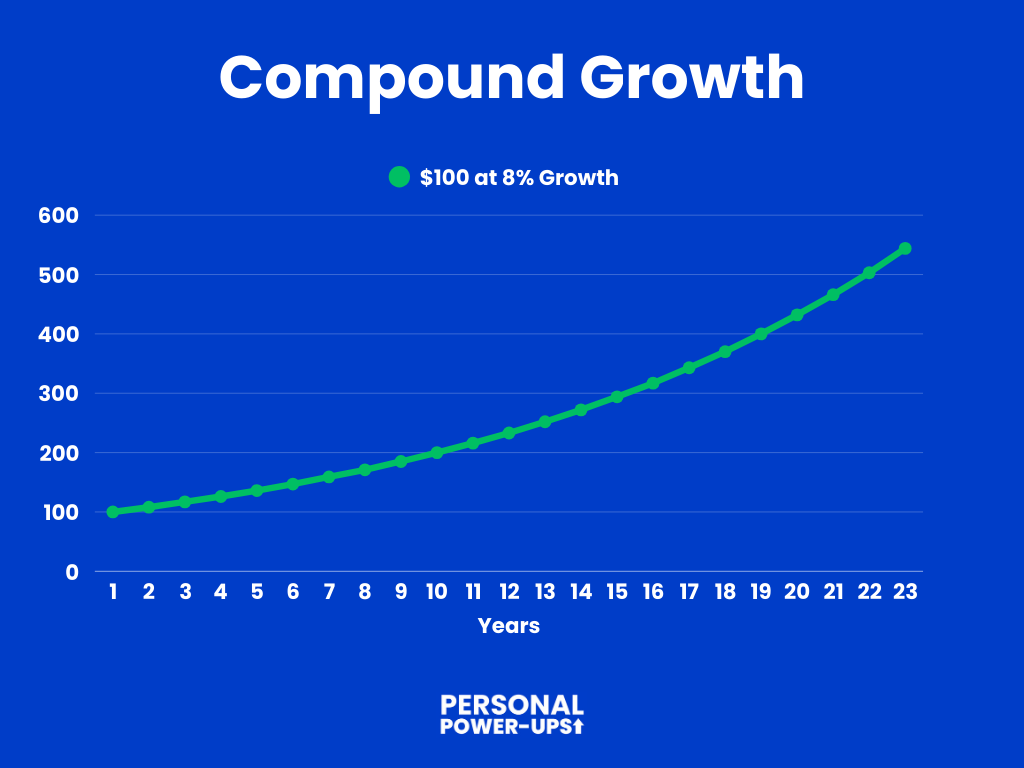You probably want to grow your money, but where do you even start? I remember how overwhelmed I felt, trying to understand stock brokers, ETF’s, ticker symbols, and all the other stuff that investing involves.
So, why bother? Well, understanding why investing matters is a key step toward building financial stability and long-term freedom. And once you understand the importance, it’ll be easier to bite the bullet.
In this article, you’ll learn the main reasons investing is important, and how it helps your money grow and work for you.
Table of Contents
1. Your Money Loses Value Over Time
If you’re not investing, your money is quietly losing value. That’s because of inflation – the steady rise in the cost of living over time. As prices go up, the same amount of money buys less.
Example:
- You have $100. Inflation is 2% per year.
- After one year, the same things that cost $100 now cost $102.
- But your $100 hasn’t grown. It still buys less than it did a year ago.
- Its real value is now closer to $98.
If this continues for years, the effect compounds. Keeping your money in cash or a low-interest account won’t protect it. Inflation keeps eating away at its value.
Investing gives your money a chance to grow. It can help you keep up with or beat inflation, so you maintain your buying power and build real wealth over time.

▼ Ad
2. You Create a Snowball Effect
When you invest, your money starts working for you. Over time, the effect builds. This is called compound growth, and it’s one of the most powerful tools in personal finance.
Each year, your investment earns a return. Then the next year, you earn a return on both the original amount and the previous return. That’s the snowball effect in action.
Example:
You invest $100 at an 8% annual return.
- Year 2: $108
- Year 3: $117
- Year 4: $126
- Year 10: $200
Your investment doubles in 10 years, without you adding more money. Over 30 years, that number grows dramatically.
The earlier you start, the more time your money has to grow.
Keep in mind that real-world returns vary. This is a simplified example, and investing involves risk. But the principle of compounding remains the same: the longer you stay invested, the more powerful the growth becomes.

3. You Diversify Your Income
Investing gives you a way to earn money beyond your job. This is called income diversification, and it’s a smart way to reduce financial risk.
When you invest in stocks, bonds, real estate, or other assets, you open the door to passive income. That might come from dividends, interest, or asset growth. Unlike your salary, passive income doesn’t require you to trade time for money.
This can act as a buffer if something unexpected happens, like job loss or a medical emergency. Having more than one income stream gives you flexibility and security.
Example:
You own stocks that pay dividends and grow in value. Even if your paycheck stops, those investments can help cover essential expenses. That cushion can reduce stress and help you stay on your feet during tough times.

▼ Ad
4. You Build Financial Security
Investing is a key part of building financial security. This means having enough resources to cover your needs, handle emergencies, and live comfortably without constant money stress.
When you invest consistently, your money grows. Over time, that growth can turn into a reliable income source and increase your net worth.
Retirement investing is one of the most common paths to financial security. Tools like 401(k)s or IRAs let you grow your money tax-efficiently. The more you invest now, the more options you’ll have later.
Investments can also serve as an emergency backup. While you should have separate savings for short-term needs, having investments gives you an extra layer of protection if things go sideways.
So, Why Is It Important To Invest Your Money?
Investing helps you:
- Protect your money from inflation
- Build momentum through compound growth
- Create new income streams
- Move closer to long-term financial freedom
That’s why investing isn’t just helpful. It’s essential.
Just remember, investing works best when you have a plan. Align your strategy with your goals, risk tolerance, and time horizon. The market isn’t predictable, but consistency and knowledge make a big difference.
Want to learn more? Then check out our articles on personal finance, like:
- How you can save more money each month.
- How you can improve your financial literacy.
- What is a bull market and bear market?
▼ Ad




